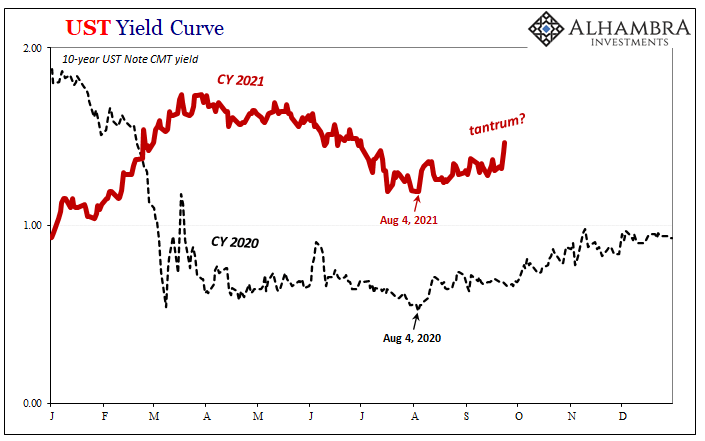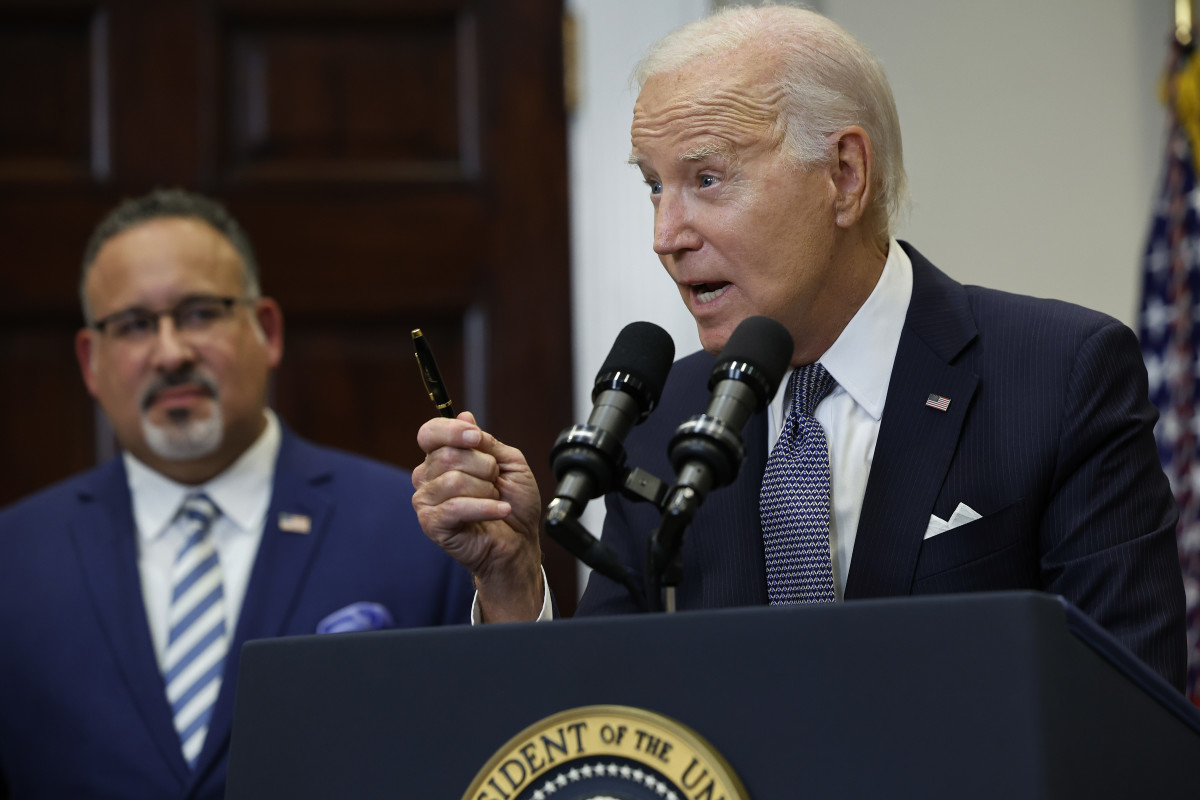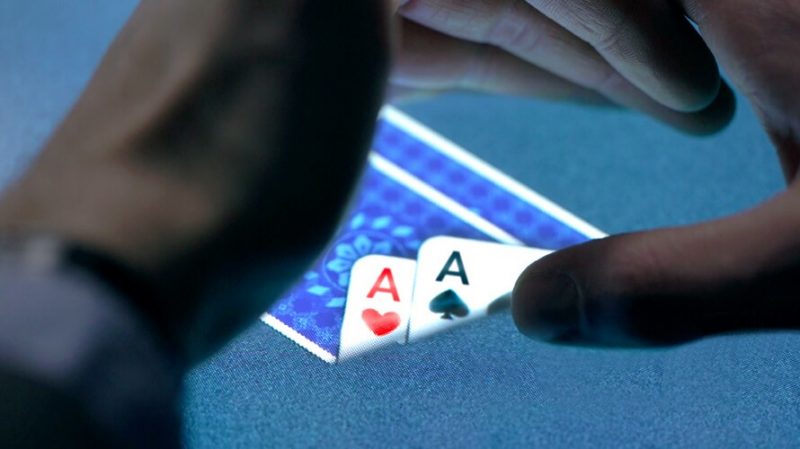Government
Finally The Taper Tantrum, Or What’s Wrong With August?
If you’re fortunate to be able to do this long enough, you’re absolutely assured to get caught with your pants down and almost certainly more than once. In the short run, it’s all a crapshoot anyway. Markets fluctuate and never, ever go in a straight…

If you’re fortunate to be able to do this long enough, you’re absolutely assured to get caught with your pants down and almost certainly more than once. In the short run, it’s all a crapshoot anyway. Markets fluctuate and never, ever go in a straight line. And just when you claim to be right on top, they yank the rug right out from under your conceit(s).
I’ve spent the past few weeks, really months pointing out how Federal Reserve policymakers via their compliant media hasn’t been able to provoke anything out of bonds. Not for lack of trying. Zilch. Nada. Forget tantrum, a whole lot of nothing even though taper – we’re always told – would spell the death of the bond “bull.” I’ve been almost gleefully highlighting how this policy farce has been greeted as a complete non-issue across all of those markets.
Until yesterday.
Finally, yields backed up both then and today in a notable selloff. Is this the long-awaited tantrum? Could it be something else?
For the former, start with Fed Governor Christopher Waller. Recall on August 2nd how Mr. Waller had appeared on CNBC and became the first voting FOMC member to encourage not just taper but a very quick one so as to clear enough calendar for a hard 2022 liftoff in rates.
Just two days later, it might appear his “go early, go fast” mantra caught on with at least some parts of the yield curve. From August 5 forward, the long end of the Treasury curve has been backing up from that recent mid-year low. August 4 was the last time before what is now a multi-week somewhat modest possibly reflationary action.
Before crowning Waller’s confidence, that particular date – August 4 – should ring a bell. Wasn’t it just last year, 2020, that longer-term bond yields had likewise bottomed out on this same day?
Yes, yes it was:
Obviously, the past two years began under very different circumstances; 2020 taking over from 2019 already close if not in recession (especially outside the US) and then the COVID errors. This year, 2021, opened in nearly opposite fashion with allegedly the whole world picking itself back up from all that damage and doing so boosted by every “stimulus” means known to man. Not just rebound, a fiery inflation-filled recovery.
Yet, in the middle of both there’s more the same than different – questions about the initial “V” shaped recovery (which did not pan out) last year and then a pretty conspicuous “growth scare” this year many are plain hoping they can blame on delta COVID for the “unexpected” soft patch.
You probably also remember how that same label “growth scare” was also thrown around quite liberally in 2019, too. Back then, the only part of the yield curve anyone is told to pay attention to had inverted, not just provoking rate cuts out of a befuddled Jay Powell but raising mainstream alarms as to impending recession (which may actually have happened, but we’ll never know for sure given the timing of the coronavirus pandemic).
Wouldn’t you know it, the low point for LT UST’s in 2019 turned out to have been…August 28!
If twice could be random coincidence, yet three times is a pattern, what is four or five? Believe it or not, this same calendar shape can be found inside every one of the last five years – even 2018 when yields were more distorted as they neared their Reflation #3 peak. That year, the same sort of mid-year downward drift reaching its floor by August 20, 2018.
And the year before, during globally synchronized growth’s reported arrival, UST rates were, for the most part, moving lower (curve flattening) as the market kept rejecting the idea that there was some legitimately inflationary recovery taking shape. The low in yields for 2017? September 5 (OK, so not August but more than close enough).

Even 2015 and 2016 were pretty close in matching this seasonality; during the latter, yields bottomed out early July and then went up (a lot) later in the Autumn. The year before, 2015, as Euro$ #3 “matured”, again a mid-year low on August 24 (following CNY’s big theatrics) which had been the same day as the eurodollar shortage striking Wall Street equities (flash crash).
While there were a couple days later on in 2015 when the 10-year yield dropped a few bps lower than August 24, still the same general trend overall.
And that trend seems to have become intriguingly normal, manifested as a regular uptick in yields especially during September and October and then lasting through the end of each year (2018 the obvious exception given the eruption of Euro$ #4’s landmine). Quite simple enough, LT yields go up after August.
Given this clear regularity, could any of these annual BOND ROUTs!!!! be considered reflationary?
Getting back to the original question, there’s quite a lot of evidence for something(s) other than Governor Waller’s melodramatic CNBC interview – or even the taper announcement and dots this week – which seems more likely to account for the bond market’s longer end behavior over the past five weeks. And this would also encompass the “big” selloff yesterday and today.
These last two days, then, have not been some unusual, tantrum-y eruption (look above at how far yields jumped in early September 2019 even as recession moved into the global forefront). Quite to the contrary, what’s happened so far over the past two months is entirely consistent with what seems to happen every year. Taper doesn’t.
This could even mean I’m actually off-the-hook, my britches still fashioned tightly right where they need to be. The Fed’s people will continue trying to provoke a bond tantrum because of their need for the public to believe taper is in charge of interest rates, yet right at this moment there’s only evidence that bonds are just doing what they normally do without regard for dots and QE’s.
This only raises the question, of course, what the hell must be going on during the month of August? Sorry for the cliffhanger, but that I’ll save for another day. Feel free, however, to tweet or comment your theories and hopefully during next week’s podcast Emil Kalinowski and I will be able to discuss them.

Government
Student loan borrowers may finally get answers to loan forgiveness issues
A major student loan service company has been invited to face Congress over its alleged servicing failures.

U.S. Sen. Elizabeth Warren (D-MA) wants answers from one of the top student loan service companies in the country for allegedly botching its student loan forgiveness process involving the federal Public Service Loan Forgiveness program, leaving borrowers confused and without answers.
The senator sent a letter to Mohela CEO Scott Giles on March 18 inviting him to testify before Congress at a hearing on April 10 titled “MOHELA’s Performance as a Student Loan Servicer.” During the hearing, Giles will have to answer for why his company allegedly failed to send billing statements to student loan borrowers in a timely manner and miscalculated monthly payments for borrowers when it was time for them to repay their loans in September last year.
Related: Here's who qualifies for Biden's student loan debt relief starting next month
Also, in the letter, Warren highlighted a report that claimed that Mohela failed to perform basic servicing functions for borrowers eligible for PSLF, which led to over 800,000 public service workers facing delays in receiving student debt relief. The report also accuses the company of using a “‘call deflection’ scheme” to keep customers away from speaking to a customer service representative and instead redirecting them to parts of their website.
“Your company has contributed to student loan borrowers’ difficulties by mishandling borrowers’ return to repayment following the COVID-19 pandemic-related pause on payments, interest, and collections and by impeding public servants’ access to PSLF relief,” wrote Warren in the letter.
The move from Warren comes after the U.S. Department of Education withheld $7.2 million in payments to its servicer Mohela in October as punishment because it failed to issue timely billing statements to 2.5 million borrowers which resulted in 800,000 borrowers becoming delinquent on their loans. The department ordered Mohela to put those affected by the issues into forbearance until the mess was resolved.
Mohela is also currently facing two class-action lawsuits, one filed in December last year and another in January this year, for its alleged “failure to timely process and render decisions for student loan borrowers enrolled in the Public Service Loan Forgiveness program.”
In response to recent criticism surrounding its alleged issues and failures regarding the PSLF program, Mohela claimed in a statement to the Missouri Independent that it “does not have authority to process loan forgiveness until authorization is provided by FSA, which can take months to occur.”
The company also claimed that there are “false accusations” inside of the bombshell report, which was released in February, that details the company’s servicing failures.
“It is unfortunate and irresponsible that information is being spun to create a false narrative in an attempt to mislead the public. False accusations are being disingenuously branded as an investigative report,” said Mohela.
white house congress pandemic covid-19International
Bolsonaro Indicted By Brazilian Police For Falsifying Covid-19 Vaccine Records
Bolsonaro Indicted By Brazilian Police For Falsifying Covid-19 Vaccine Records
Federal police in Brazil have indicted former President Jair…

Federal police in Brazil have indicted former President Jair Bolsonaro for falsifying his Covid-19 vaccine card in order to travel to the United States and elsewhere during the pandemic.
Federal prosecutors will review the indictment and decide whether to pursue the case - which would be the first time the former president has faced criminal charges.
According to the indictment, Bolsonaro ordered a top deputy to obtain falsified Covid-19 vaccine records of himself and his 13-year-old daughter in late 2022, right before he flew to Florida for a three-month stay following his election loss.
Brazilian police are also waiting to hear back from the US DOJ on whether Bolsonaro used said cards to enter the United States, which would open him up to further criminal charges, the NY Times reports.
Bolsonaro has repeatedly claimed not to have received the Covid-19 vaccine, but denies any involvement in a plan to falsify his vaccination records. A previous investigation by Brazil's comptroller general concluded that Bolsonaro's vaccination records were false.
The records show that Bolsonaro, a COVID-19 skeptic who publicly opposed the vaccine, received a dose of the immunizer in a public healthcare center in Sao Paulo in July 2021. [ZH: hilarious, Reuters calling the vaccine an 'immunizer.']
The investigation concluded, however, that the former president had left the city the previous day and didn't leave Brasilia until three days later, according to a statement.
The nurse listed in the records as having applied the vaccine on Bolsonaro denied doing so and was no longer working at the center. The listed vaccine lot was also not available on that date, the comptroller general's office said. -Reuters
"It's a selective investigation. I'm calm, I don't owe anything," Bolsonaro told Reuters. "The world knows that I didn't take the vaccine."
During the pandemic, Bolsonaro panned the vaccine - and instead insisted on alternative treatments such as Ivermectin, which has antiviral properties against Covid-19. For this, he was investigated by Brazil's congress, which recommended that the former president be charged with "crimes against humanity," among other things, for his actions during the pandemic.
In May, Brazilian police raided Bolsonaro's home, confiscating his cell phone and arresting one of his closest aides and two of his security cards in connection to the vaccine record investigation.
Brazil's electoral court ruled that Bolsonaro can't run for public office until 2030 after he suggested that the country's voting system was rigged. For that, he has to sit out the 2026 election.
International
This gambling tech stock is future-proofing the world’s casinos
Supported by the universal thrill of a quick payout and the need for leisure, gambling stocks make a compelling case for long-term returns.
The post This…

Supported by the universal human thrill of a quick payout, and the need for leisure and entertainment to bring enjoyment to adult life, casinos will remain essential spaces for people to dream and play for the foreseeable future, making gambling stocks a prospective space to look for long-term returns.
According to Research and Markets, the global casino industry was valued at US$157.5 billion in 2022, and it will grow to US$224.1 billion by 2030 at a compound annual growth rate of 4.5 per cent. This trend includes:
Approximately 100 million gamblers in the United States, who generated US$66.5 billion in revenue in 2023, a 10 per cent gain from 2022, which itself was a record year A little fewer than 20 million gamblers in Canada, who generated about C$15 billion in revenue in 2023 A global addressable market of thousands of casinos, and more than 4.2 billion people who gamble at least once every year, according to a 2016 study by Casino.orgThe main challenge with attracting these billions through casino doors is they sway heavily toward middle age. The mean age of U.S. casino visitors has hovered around 50 for the past decade, with a similar trend across the world, forcing casinos to attract younger, tech-savvy customers, many with less gambling experience, to continue growing profits for their stakeholders over the long term.
Investors seeking exposure to a leadership position in building the bridge between casinos and the next generation of gamblers should evaluate Jackpot Digital (TSXV:JJ). The Vancouver-based company is a manufacturer of dealerless electronic table games that deliver immersive experiences tailored to the digital age, while earning casinos attractive returns on investment.
The gambling technology stock benefits from no direct competition in the dealerless poker space, with orders spanning North America, Europe, Asia, Africa and the Caribbean, a long-established presence with major cruise ship brands, such as Carnival, Princess Cruises and Holland America, and a growing land-based presence with orders or ongoing installations across 12 U.S. states. Its highlight partnership to date is a master services agreement with Penn Entertainment, the country’s largest regional gaming operator with 43 properties across 20 states.
Jackpot Digital’s differentiated technology and well-rounded management team are at the heart of its success in landing several blue-chip casino gaming companies as customers.
Jackpot BlitzThe gambling technology stock’s flagship product, Jackpot Blitz, is a dealerless poker table featuring three of the world’s most popular variations – Texas Hold’ em, Omaha, and Five-Card-Omaha – brought to life through slick 4k graphics on a 75-inch touchscreen, and offered in three formats – pot-limit, no-limit and fixed-limit – designed to attract a diversity of revenue from casual to experienced players.
Spokesperson and NFL championship-winning coach Jimmy Johnson explains the benefits of the Jackpot Blitz. Source: Jackpot Digital.The table also comes equipped with house-banked mini-games, including blackjack, baccarat and video poker, as well as side bets on the main poker game, such as Bet the Flop, all of which keep players engaged and entertained between, and even during, poker hands. The stunning Jackpot Blitz machine also offers multi-venue “Bad Beat” jackpot functionality, allowing casinos to offer a “Poker Powerball” with massive Jackpots, further enhancing the attractiveness of Jackpot Blitz to new players.
It’s by striking a balance between the needs of the modern gambler, and efficiency and profitability that in-person operators couldn’t hope to match – unless they ordered the machine for themselves – that Jackpot Digital has earned itself the top spot in dealerless poker.
Player benefitsWhen a veteran or novice gambler takes a seat at the Jackpot Blitz, his or her experience begins with an easy-to-use interface, laid out in a modern and stylish design, programmed to respond to hand gestures that bring real casino play into the digital age, including card bending and chip jingling.
Source: Jackpot Digital.The table’s intuitive controls, combined with instant payouts and its dealerless nature, translate into faster game play, which maximizes playing time and player excitement, while minimizing human error and the intimidation new gamblers might feel about approaching an analog poker table. The gambling technology stock’s in-house development team is also constantly working on new games to keep content fresh, with a special focus on bringing international games and regional versions of poker to casino audiences in Asia, South America and the Indian subcontinent.
As hands are laid down and pots pile up, players can also track game stats in real time, which inform future strategy and enhance the thrill of the moment with an added element of competition.
Operator benefitsFrom an operator’s perspective, a floor of automated gaming tables can meaningfully and instantly reduce casino staff expenditures and management pain points, while avoiding wage inflation, labour shortages and supply costs.
The Blitz is no slouch on revenue either, dealing more hands per hour, resulting in higher revenue and higher profitability, which is further enhanced by onboard side bets and mini-games that can be played while players are engaged in a poker hand.
The Jackpot Blitz’s economics are attractive to operators thanks to its ability to accommodate non-stop play, while monetizing downtime through side games and bets. While a human dealer must spend time shuffling, interacting with players, and consulting with colleagues, the Jackpot Blitz can accept wagers 100 per cent of the time, making sure gamblers get the action they came for and operators see a return on their investment.
 Source: Jackpot Digital.
Source: Jackpot Digital.
Beyond gaming revenue, casinos are further incentivized to onboard the Jackpot Blitz because of its fully customizable advertising functions, including logos, card backs, chips and felt colors, all of which bolster casino culture and enable the pursuit of revenue from third-party advertising partners.
The Blitz ties its value proposition together by generating automatic reports – including demographics and consumer behaviour through a rewards card system – and plugging directly into most back-end management systems, saving casinos the hassle of manual tracking, while also minimizing tampering, money-laundering and theft through the use of isolated servers.
Whether it’s streamlining the player experience or putting automation at the service of operators’ bottom lines, Jackpot Digital’s flagship product is positioned to create value, and plenty of it.
Jackpot Digital’s path to profitabilityAfter existing as an exclusively cruise-ship-based operation since 2015, Jackpot Digital suffered a steep decline in revenue during the COVID pandemic, falling from C$2.18 million in 2019 to C$0.42 million in 2021.
Management quickly pivoted in the face of uncertainty, redesigning the Blitz to execute on a land-based expansion strategy – backed by Gaming Labs International certification in fall 2023 – which is bringing about a successful turnaround after the re-emergence of the casino business. Revenue more than tripled to C$1.43 million in 2022, and reached C$1.57 million through three quarters of 2023, with the company expecting to ramp up significant recurring revenue after it installs several dozen machines currently in its backlog.
 The Jackpot Blitz electronic gaming table in action. Source: Jackpot Digital.
The Jackpot Blitz electronic gaming table in action. Source: Jackpot Digital.
The first installation of land-ready Jackpot Blitz machines is now completed at the Jackson Rancheria Casino in California, as the company announced today. The three-machine installation marks a new era of growth for the company, having announced 25 Blitz deals since November 2021 (slide 12), with many more across Canada and the United States in the works, in addition to a strong pipeline in Asia and Europe.
“Jackpot Digital could be a profitable company right now if it only focused on care and maintenance of the revenues it currently generates. But that’s not why we’re here,” Mathieu McDonald, Vice President of Corporate Development at Jackpot Digital, said in a recent interview with Stockhouse. “We intend to scale up to many multiples of the tables we have out right now, with the potential for up to 2,000 tables over the next three to five years.”
According to McDonald, the company is fielding three to five inquiries per week about the Blitz from casinos around the world that recognize the machines’ first-mover advantage in dealerless poker and potential expansion into other games in need of automation.
Jackpot Digital’s ambitious plan of action is supported by a management team of proven gambling, finance, advertising and legal professionals, many of which have been serving Jackpot stakeholders for more than two decades.
A long-tenured management teamThe management team behind Jackpot Digital is led by Jake Kalpakian, who has served as president and chief executive officer since 1999, including under the gambling technology stock’s former incarnation as Las Vegas From Home.com Entertainment Inc. Kalpakian brings more than 30 years of experience managing small-cap publicly listed companies, granting him a steady hand when it comes to maneuvering through the volatility of the economic cycle.
Kalpakian’s efforts are supported by three directors whose well-rounded expertise positions Jackpot Digital for long-term sustainable growth:
Gregory T. McFarlane, a director at Jackpot Digital since 1999, previously ran an independent advertising firm and holds a degree in mathematics from the University of Toronto. McFarlane is also a co-founder of the popular Control Your Cash personal finance website. Chief financial officer Neil Spellman, a director at the company since 2002, boasts an almost two-decade track record as vice president at Wall Street firm Smith Barney, where he developed a multi-industry understanding of the journey to profitability. Finally, Alan Artunian, a director since 2017, currently serves as CEO of Nice Guy Holdings, a corporate and legal consulting company advising clients across a diversity of sectors.Guided by a strategic management team, and benefiting from a macro-trend toward casino automation, Jackpot Digital is on course to ride a wave of millions of gamblers looking for an elegant, tech-informed alternative to traditional in-person play.
A multi-bagger opportunityThe Jackpot Digital opportunity sets up savvy investors who recognize the soundness of the company’s value proposition. The tremendous risk/reward value of Jackpot Digital gives investors the opportunity to ride the macro-trend toward casino automation, as deals for the Blitz keep pouring in, the company adds games to its portfolio, and the global casino industry adds hundreds of billions in revenue through this decade.
Join the discussion: Find out what everybody’s saying about this gambling technology stock on the Jackpot Digital Bullboard.
This is sponsored content issued on behalf of Jackpot Digital, please see full disclaimer here.
The post This gambling tech stock is future-proofing the world’s casinos appeared first on The Market Online Canada.
stocks pandemic small-cap africa south america canada europe-

 Spread & Containment6 days ago
Spread & Containment6 days agoIFM’s Hat Trick and Reflections On Option-To-Buy M&A
-

 Uncategorized4 weeks ago
Uncategorized4 weeks agoAll Of The Elements Are In Place For An Economic Crisis Of Staggering Proportions
-

 International2 weeks ago
International2 weeks agoEyePoint poaches medical chief from Apellis; Sandoz CFO, longtime BioNTech exec to retire
-

 Uncategorized1 month ago
Uncategorized1 month agoCalifornia Counties Could Be Forced To Pay $300 Million To Cover COVID-Era Program
-

 Uncategorized4 weeks ago
Uncategorized4 weeks agoApparel Retailer Express Moving Toward Bankruptcy
-

 Uncategorized1 month ago
Uncategorized1 month agoIndustrial Production Decreased 0.1% in January
-

 International2 weeks ago
International2 weeks agoWalmart launches clever answer to Target’s new membership program
-

 Uncategorized1 month ago
Uncategorized1 month agoRFK Jr: The Wuhan Cover-Up & The Rise Of The Biowarfare-Industrial Complex





















